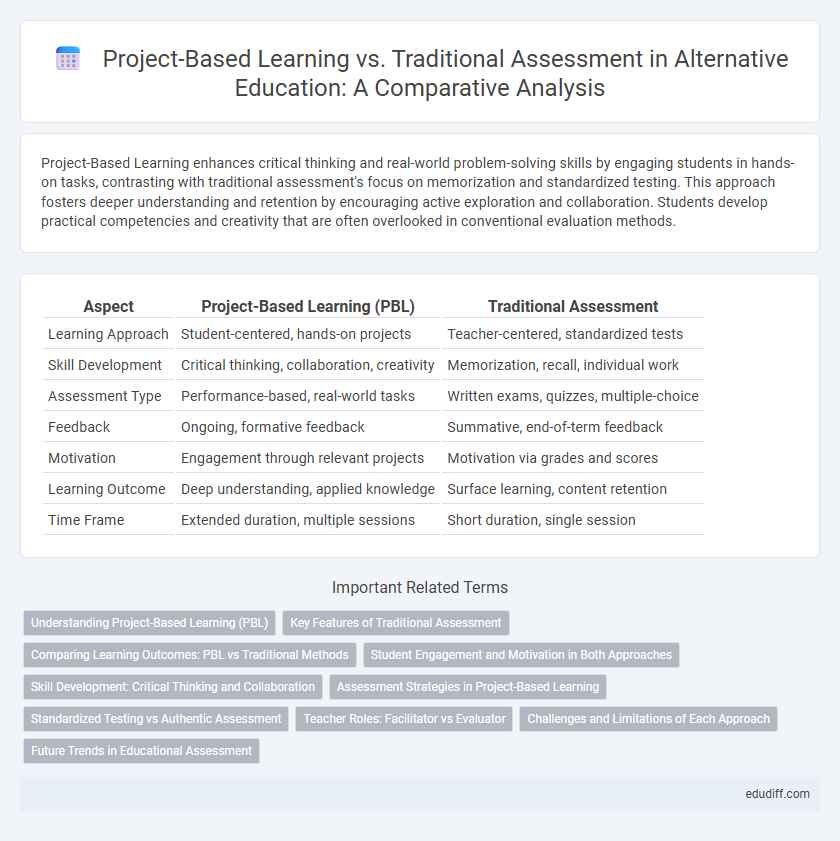Project-Based Learning enhances critical thinking and real-world problem-solving skills by engaging students in hands-on tasks, contrasting with traditional assessment's focus on memorization and standardized testing. This approach fosters deeper understanding and retention by encouraging active exploration and collaboration. Students develop practical competencies and creativity that are often overlooked in conventional evaluation methods.
Table of Comparison
| Aspect | Project-Based Learning (PBL) | Traditional Assessment |
|---|---|---|
| Learning Approach | Student-centered, hands-on projects | Teacher-centered, standardized tests |
| Skill Development | Critical thinking, collaboration, creativity | Memorization, recall, individual work |
| Assessment Type | Performance-based, real-world tasks | Written exams, quizzes, multiple-choice |
| Feedback | Ongoing, formative feedback | Summative, end-of-term feedback |
| Motivation | Engagement through relevant projects | Motivation via grades and scores |
| Learning Outcome | Deep understanding, applied knowledge | Surface learning, content retention |
| Time Frame | Extended duration, multiple sessions | Short duration, single session |
Understanding Project-Based Learning (PBL)
Project-Based Learning (PBL) engages students through real-world problems and collaborative projects, promoting critical thinking and deeper understanding of subject matter. Unlike traditional assessment, which often emphasizes memorization and standardized testing, PBL assesses students' ability to apply knowledge in practical contexts. Research shows PBL improves retention, creativity, and motivation by integrating interdisciplinary skills and continuous feedback.
Key Features of Traditional Assessment
Traditional assessment emphasizes standardized testing formats such as multiple-choice, true/false, and short answer questions designed to evaluate learners' knowledge retention and understanding efficiently. It relies on fixed criteria, allowing for objective grading and easy comparison across large student populations. Typically timed and individual, these assessments prioritize memorization and recall over critical thinking and real-world application.
Comparing Learning Outcomes: PBL vs Traditional Methods
Project-Based Learning (PBL) enhances critical thinking, collaboration, and real-world problem-solving skills, leading to deeper understanding and higher retention of knowledge compared to traditional assessment methods, which often prioritize memorization and standardized testing. Studies show PBL students demonstrate improved engagement and ability to apply concepts in practical contexts, whereas traditional assessments typically measure discrete knowledge through exams and quizzes. The emphasis on active learning in PBL fosters creativity and adaptability, skills less developed through conventional evaluation approaches.
Student Engagement and Motivation in Both Approaches
Project-Based Learning (PBL) significantly enhances student engagement and motivation by immersing learners in real-world challenges that foster critical thinking and collaboration. Traditional assessment often relies on standardized testing, which may limit motivation due to its focus on memorization and performance under pressure. Research indicates that PBL cultivates intrinsic motivation more effectively by offering autonomy and relevance, leading to higher retention and sustained interest in subject matter.
Skill Development: Critical Thinking and Collaboration
Project-Based Learning enhances skill development by actively engaging students in real-world problem solving, fostering critical thinking through analysis and synthesis of information. Collaboration is integral, as students work in teams to share diverse perspectives and build collective solutions. Traditional assessment often emphasizes memorization and individual performance, limiting opportunities for developing these essential skills.
Assessment Strategies in Project-Based Learning
Project-Based Learning (PBL) employs dynamic assessment strategies such as formative evaluations, peer reviews, and real-time feedback to measure student understanding, contrasting with the static nature of traditional summative assessments. In PBL, assessments are integrated with project milestones, emphasizing critical thinking, collaboration, and problem-solving skills over rote memorization. This approach fosters deeper learning by evaluating students' application of knowledge in authentic, real-world contexts.
Standardized Testing vs Authentic Assessment
Project-Based Learning emphasizes authentic assessment by evaluating students through real-world tasks and demonstrations of knowledge, fostering critical thinking and problem-solving. Traditional assessment relies heavily on standardized testing, which measures student performance with uniform criteria but often overlooks practical application and deeper understanding. Authentic assessments in Project-Based Learning provide a more comprehensive evaluation of student skills and engagement compared to the limited scope of standardized tests.
Teacher Roles: Facilitator vs Evaluator
Teacher roles in project-based learning emphasize facilitation, guiding students through inquiry and collaboration to deepen understanding, rather than merely evaluating their knowledge. In contrast, traditional assessment positions teachers primarily as evaluators who measure student performance through standardized tests and examinations. This shift from evaluator to facilitator fosters a more dynamic learning environment where teachers support critical thinking and problem-solving skills.
Challenges and Limitations of Each Approach
Project-Based Learning faces challenges such as time-intensive planning, uneven student participation, and difficulties in consistent assessment of diverse skill sets. Traditional assessment often limits student creativity, emphasizes rote memorization, and may not accurately reflect real-world problem-solving abilities. Both approaches require balancing engagement with measurable outcomes to optimize educational effectiveness.
Future Trends in Educational Assessment
Project-Based Learning (PBL) emphasizes real-world problem-solving and interdisciplinary skills, aligning with future trends that prioritize competency-based assessments and personalized learning pathways. Traditional assessments often rely on standardized testing, whereas emerging approaches integrate digital portfolios and formative feedback mechanisms driven by artificial intelligence. The shift towards adaptive, performance-based evaluation models reflects the growing demand for education systems to measure critical thinking, collaboration, and creativity effectively.
Project-Based Learning vs Traditional Assessment Infographic

 edudiff.com
edudiff.com